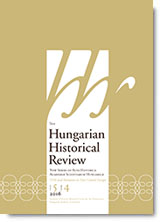Return Migration to Austria-Hungary from the United States in Homeland Economic and Ethnic Politics and International Diplomacy
Return Migration to Austria-Hungary from the United States in Homeland Economic and Ethnic Politics and International Diplomacy
Author(s): Kristina E. PoznanSubject(s): Pre-WW I & WW I (1900 -1919)
Published by: Magyar Tudományos Akadémia Bölcsészettudományi Kutatóközpont Történettudományi Intézet
Keywords: Austria-Hungary; emigration; loyalty; nationalism; pan-Slavism; return migration
Summary/Abstract: While Austro-Hungarian officials initially opposed emigration and considered it disloyal to leave the homeland, the massive growth of transatlantic labor migration, its economic benefits, and its potentially temporary duration prompted a change in governmental attitudes and policy at the turn of the twentieth century. Even as it continued to discourage and police the exit of emigrants, the Hungarian government, in particular, also became an active promoter of return migration. Using files from the Hungarian Prime Minister’s Office, the Hungarian Ministry of Agriculture, and the joint Austro-Hungarian Foreign Ministry, this article examines the Hungarian government’s attempts to encourage return migration to further its economic and nationalist goals. These initiatives emphasized the homecoming of desirable “patriotic” subjects, of Hungarian-speakers, and of farmers and skilled industrial workers to address the state’s perceived labor needs. Officials debated the risks of welcoming back migrants with undesirable social and political orientations and speakers of minority languages, as well as the risks of potential conflicts with the United States government.
Journal: The Hungarian historical review : new series of Acta Historica Academiae Scientiarum Hungaricae
- Issue Year: 6/2017
- Issue No: 3
- Page Range: 647-667
- Page Count: 21
- Language: English

